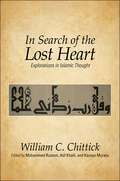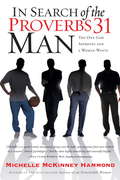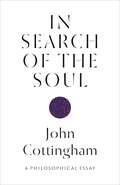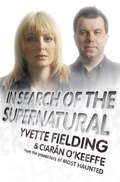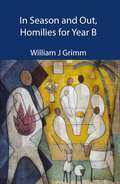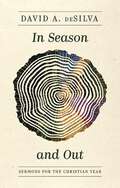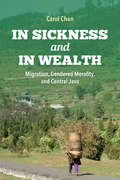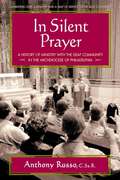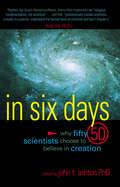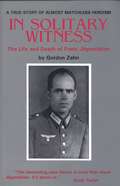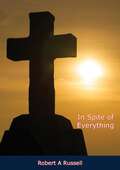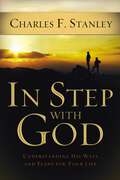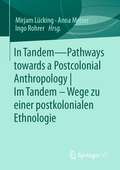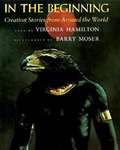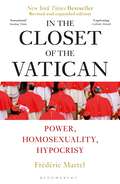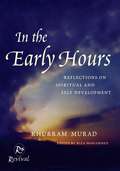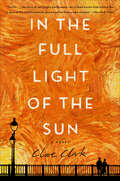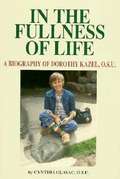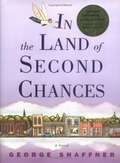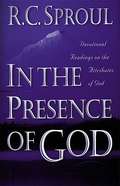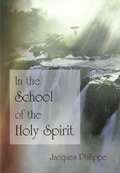- Table View
- List View
In Search of the Lost Heart: Explorations in Islamic Thought
by William C. ChittickIn Search of the Lost Heart brings together twenty-six essays by William C. Chittick, renowned scholar of Sufism and Islamic philosophy. Written between 1975 and 2011, most of these essays are not readily available in Chittick's own books. Although this is a collection, its editors have crafted it to be a book "sufficient unto itself, which, when taken as a whole, can be said to explore the underlying worldview of Islam."Chittick draws upon the writings of towering figures such as Ibn al-'Arabī, Rūmī, and Mullā Ṣadrā, as well as other important, but lesser-known thinkers, as he engages with a wide variety of topics, such as the nature of being and knowledge, the relationship between love and scriptural hermeneutics, the practical and theoretical dimensions of Islamic mysticism, the phenomenon of religious diversity, and the ecological crisis.
In Search of the Proverbs 31 Man: The One God Approves and a Woman Wants
by Michelle Mckinney HammondThe Secrets to Finding, Nurturing–or Being–an Irresistible Man. Never before has the search for real connection between the sexes been more important–or more confusing. Single women want to know what they should ask for–not settle for–in a mate, while married women wonder how they can nurture godly character traits in their husbands. Men, both single and married, wonder what womenreallywant. Both genders are long on questions and short on answers. Where Can Men and Women Go for Help? In Proverbs 31, Scripture presents a powerful composite of a virtuous woman. But what about the virtuous man–what does the Bible say about him? Popular Bible teacher Michelle McKinney Hammond tackles this timely and important question, digging into Scripture to study key men–from Adam to Christ himself, the ultimate bridegroom–to learn what God requires of husbands and men, and to lay out a trustworthy model of how men and women can live in healthy, fulfilling relationship. Find out what you can do to identify, nurture–or become–a truly godly man and mate inIn Search of the Proverbs 31 Man. “This is not a man bashing book, but one that champions the original design for their lives. Women need real men. ”–Michelle McKinney Hammond From the Trade Paperback edition.
In Search of the Soul: A Philosophical Essay
by John CottinghamHow our beliefs about the soul have developed through the ages, and why an understanding of it still matters todayThe concept of the soul has been a recurring area of exploration since ancient times. What do we mean when we talk about finding our soul, how do we know we have one, and does it hold any relevance in today’s scientifically and technologically dominated society? From Socrates and Augustine to Darwin and Freud, In Search of the Soul takes readers on a concise, accessible journey into the origins of the soul in Western philosophy and culture, and examines how the idea has developed throughout history to the present. Touching on literature, music, art, and theology, John Cottingham illustrates how, far from being redundant in contemporary times, the soul attunes us to the importance of meaning and value, and experience and growth. A better understanding of the soul might help all of us better understand what it is to be human.Cottingham delves into the evolution of our thoughts about the soul through landmark works—including those of Aristotle, Plato, and Descartes. He considers the nature of consciousness and subjective experience, and discusses the psychoanalytic view that large parts of the human psyche are hidden from direct conscious awareness. He also reflects on the mysterious and universal longing for transcendence that is an indelible part of our human makeup. Looking at the soul’s many dimensions—historical, moral, psychological, and spiritual—Cottingham makes a case for how it exerts a powerful pull on all of us.In Search of the Soul is a testimony to how the soul remains a profoundly significant aspect of human flourishing.
In Search of the Spirit, A Primer
by Mary Mcdermott ShidelerDescribes ways to get in touch with the spirit
In Search of the Supernatural
by Yvette Fielding Ciaran O'KeeffeYvette Fielding and Ciarn OKeeffe, star presenters of Living TVs Most Haunted, are on a mission - to uncover the truth behind paranormal sightings in the UK and abroad. Exclusively done for this book, their search takes them to some of Britains most frightening locations, including the notorious tunnels beneath the streets of Liverpool and the Devil's Arse in the Peak district. But its not just ghosts theyre investigating. Also on the radar are the Cathar mysteries of south-west France, made famous in The Da Vinci Code So if you believe in the supernatural or if you want to hear the evidence for yourself look no further. Just open this book
In Search of the Supernatural
by Yvette Fielding Ciaran O'keeffeYvette Fielding and Ciarn OKeeffe, star presenters of Living TVs Most Haunted, are on a mission - to uncover the truth behind paranormal sightings in the UK and abroad. Exclusively done for this book, their search takes them to some of Britains most frightening locations, including the notorious tunnels beneath the streets of Liverpool and the Devil's Arse in the Peak district. But its not just ghosts theyre investigating. Also on the radar are the Cathar mysteries of south-west France, made famous in The Da Vinci Code So if you believe in the supernatural or if you want to hear the evidence for yourself look no further. Just open this book
In Season and Out, Homilies for Year B
by William J. GrimmThe Catholic Church lives on two lungs-Word and Sacrament. They reach their clearest expression and celebration for the Church's life in the Eucharist-the 'source and summit of the Church's life' as Vatican 2 puts it. Father William J Grimm is a Maryknoll Missioner of 40 years experience in Asia-mostly Japan, but Hong Kong and Cambodia as well. In that time he has come to deepen his understanding of the distinctiveness of the message and person of Jesus Christ even in circumstances and among people that Jesus could never have known or imagined. It is not enough to understand what the readings mean as those who composed them intended us to grasp. The critical thing is to find what that meaning might be in the context of our times and contexts. Speaking the Word in our time and for our places is the challenge of preaching and it is to that challenge that Fr Grimm devotes his learning, experience and imagination. Every week for the Church's three year liturgical cycle, Fr Grimm gives visitors to www.ucanews.com-UCAN-the benefit of his learning, prayer, wisdom and experience. Each week, his homilies for Sundays and special feasts are seen by some 3,000 visitors to the main UCAN site and with subtitles on UCAN's Vietnamese and Chinese sites. Now the text of those homilies is published not only to assist preachers in the preparation of their homilies but for anyone wanting to deepen their under-standing of the text and find material for fruitful prayer on the Sunday readings.
In Season and Out: Sermons for the Christian Year
by David A. DeSilvaGrow in the Scriptures throughout the church year with David deSilva as your mentor. Beginning with Advent and moving through the church year, David deSilva brings his years of experience as a biblical scholar to the church in the form of sermons delivered to his home congregation throughout the church year, now adapted into a thoughtful and inspiring collection of reflections. These reflections, which draw on readings from the Revised Common Lectionary, will inform and inspire your understanding of Scripture, written with Dr. deSilva's characteristic warmth and wisdom. In Season and Out makes for excellent devotional reading that will feed saints both in front of and behind the pulpit.
In Sickness and in Wealth: Migration, Gendered Morality, and Central Java (Framing the Global)
by Carol ChanVillagers in Indonesia hear a steady stream of stories about the injuries, abuses, and even deaths suffered by those who migrate in search of work. So why do hundreds of thousands of Indonesian workers continue to migrate every year? Carol Chan explores this question from the perspective of the origin community and provides a fascinating look at how gender, faith, and shame shape these decisions to migrate. Villagers evaluate men's and women’s migrations differently, leading to different ideas about which kinds of human or financial flows should be encouraged and which should be discouraged or even criminalized. Despite routine and well-documented instances of exploitation of Indonesian migrant workers, some villagers still emphasize that a migrant's success or failure ultimately depends on that individual’s morality, fate, and destiny. Indonesian villagers construct strategies for avoiding migration-related risks that are closely linked to faith and belief in supernatural agency. These strategies shape the flow of migration from the country and help to ensure the continued confidence Indonesian people have in migration as an act of promise and hope.
In Silence with God
by Benedict BaurThis book is written to help those seeking to follow our Lord to obtain the silence of the soul necessary to hear and understand the will of God.
In Silent Prayer
by Anthony RussoWritten by Father Anthony Russo, who has devoted himself to the deaf community for over forty years,In Silent Prayer traces the history of the special deaf ministry in the Roman Catholic Archdiocese of Philadelphia. Through insightful text, as well as historical documents and photographs, Father Russo not only tells the story of the great men and women who have provided this important service, but also looks forward to the coming years and considers how this service can be further shaped and improved.n
In Six Days
by John AshtonWhy would any educated scientist with a PhD advocate a literal interpretation of the six days of creation? Why, indeed, when only one in three Americans believes "the Bible is the actual word of God and is to be taken literally, word for word" according to a recent Gallup poll. Science can neither prove nor disprove evolution any more than it can creation. Certainly there are no human eyewitness accounts of either. However, certain factors are present today which are capable of swaying one's beliefs one way or the other. In this book are the testimonies of fifty men and women holding doctorates in a wide range of scientific fields who have been convicted by the evidence to believe in a literal six-day creation. For example, meet: The geneticist who concludes that there must have been 150 billion forerunners of "modern man" in order for the natural selection required by evolution to have taken place in the development of man. The evidence for such vast numbers of "prehistoric man" is in dire shortage. The orthodontist who discovered that European museum fossils of ancient man have been tampered with to adhere to evolution theories. The geologist who studied under the late Stephen Jay Gould and literally cut the Bible to pieces before totally rejecting evolution. All fifty of these scientists, through faith and scientific fact, have come to the conclusion that God's Word is true and everything had its origin not so very long ago, in the beginning, In Six Days.
In Solitary Witness: The Life and Death of Franz Jägerstätter
by Gordon C. ZahnFor more than 20 years unknown and ignored by his church and fellow countrymen--today a national hero and acclaimed as an authentic martyr/saint. This is the book that 'discovered' Franz Jägerstätter and his inspiring story of unyielding resistance to Nazi orders and his commitment to the dictates of conscience even at the cost of life itself."
In Spite of Everything
by Robert A RussellWhy are you reading this book? We have to assume that the title interested or challenged you. We have to assume that from experience you know what it is to meet with a difficulty that must be overcome, to climb a mountain that seemingly has no crest, to follow a trail that has proved endless, to endure a pain or sorrow from which there seems to be no escape.These are experiences common to man. Unfortunately, the will to overcome "in spite of everything" is less common. Fortunate is the individual who learns that obstacles, heights, and barriers do not have to be conquered by the will alone, who learns that since he is one with God, he has access to all the Might and Power and Majesty of the spiritual kingdom.This book is for the man in search of knowledge of his spiritual power and of the way to use it wisely. This book, then, is for everyone. Deep in man's heart is his desire to live a good life, to earn promised blessings, to help build a better world. Universal experiences tend to reinforce the knowledge that all men are brothers and that the spiritual man triumphs in the end.Someone has wisely said that there are in the end only two motives for action. We act "in spite of" something or "because of" it. In reality, the two are one, for determination to overcome, to conquer, to demonstrate power depends upon the ability to sense the need and the awareness of potential power to meet it. The end result is the same whether we act in spite of opposition or because of encouragement.May you find the help you seek as you study these pages!
In Step With God: Understanding His Ways and Plans for Your Life
by Charles F. StanleyWhat is God like? Can I trust Him? Does He know me and can He help me tackle the challenges I face?Most people know a little something about God, but their knowledge of who He is and how He works stops just past the point of an initial introduction.Why is it so important to know the One who knows all about you? The answer is simple: when you come to a point where you understand His ways, your life takes on new meaning. You stop looking at old problems and feeling defeat, fear, and anxiety. Suddenly, you realize that the Person who gave you life has set an amazing course for you to follow.In Step with God offers simple, clear teaching that encourages and challenges you to approach life and its decisions—both big and small—by first knowing and considering God&’s character.&“The nearer I draw to the Lord,&” writes Dr. Stanley, &“the more I will know about Him—His love for me and His good plans and desires for my life. Plus, the more intimate I become with God, the better I understand His way, and this understanding leads to a deeper longing to know God better. I learn how to discern His will for my life and the situations I encounter.&”
In Tandem – Pathways towards a Postcolonial Anthropology | Im Tandem – Wege zu einer postkolonialen Ethnologie
by Ingo Rohrer Mirjam Lücking Anna MeiserPostkoloniale Ansätze in der Ethnologie zeichnen sich durch eine kritische Reflexion der eigenen Wissenschaftsgeschichte aus und denken dabei theoretische und methodologische Ansätze des Faches weiter. Sie laden dazu ein, sich kritisch mit der Verstrickung der Disziplin in koloniale Prozesse und der Aufrechterhaltung von ungleichen Machtstrukturen auseinanderzusetzen. Postkoloniale Ansätze hinterfragen die Autorität ethnologischer Wissenskonstruktion und die damit verbundene Repräsentation des kulturell „Anderen“ sowie des „Eigenen“. Darüber hinaus lenkt eine postkoloniale Ethnologie den Blick auf transkulturelle Verflechtungen, etwa lokale Interpretationen globaler Symbole und Praktiken. Damit destabilisiert sie vermeintlich „universale“ Erklärungsmuster und Konzepte, verortet sie in Zeit und Raum.Die Beiträge in diesem, Judith Schlehe gewidmeten Sammelband veranschaulichen, welche fruchtbaren Implikationen ein postkolonialer Impetus für die ethnologische Forschung, Theorie und Praxis bereithalten kann. Angelehnt an die von Judith Schlehe entwickelte „Tandem“-Forschung stellen die AutorInnen in ihren eigenen Studien kollaborative und kulturell reziproke Prozesse vor. Sie zeigen alternative Deutungen zu „westlichen“ Sichtweisen auf und verdeutlichen deren Relevanz für das Fach.
In The Beginning: Creation Stories from Around the World
by Virginia HamiltonA thought-provoking collection of twenty-five stories that reflect the wonder and glory of the origins of the world and humankind. With commentary by the author. <P><P> Newbery Medal Honor book
In The Closet Of The Vatican: Power, Homosexuality, Hypocrisy
by Shaun Whiteside Frederic MartelIn the Closet of the Vatican exposes the rot at the heart of the Vatican and the Roman Catholic Church today. This brilliant piece of investigative writing is based on four years' authoritative research, including extensive interviews with those in power. <p><P> The celibacy of priests, the condemnation of the use of contraceptives, the cover up of countless cases of sexual abuse, the resignation of Benedict XVI, misogyny among the clergy, the dramatic fall in Europe of the number of vocations to the priesthood, the plotting against Pope Francis – all these issues are clouded in mystery and secrecy. <P><P> In the Closet of the Vatican is a book that reveals these secrets and penetrates this enigma. It derives from a system founded on a clerical culture of secrecy which starts in junior seminaries and continues right up to the Vatican itself. It is based on the double lives of priests and on extreme homophobia. The resulting schizophrenia in the Church is hard to fathom. But the more a prelate is homophobic, the more likely it is that he is himself gay. <P><P> 'Behind rigidity there is always something hidden, in many cases a double life'. These are the words of Pope Francis himself and with them the Pope has unlocked the Closet. <P><P> No one can claim to really understand the Catholic Church today until they have read this book. It reveals a truth that is extraordinary and disturbing.
In The Early Hours
by Khurram MuradHow are we to become true believers who seek God's good pleasure? How are we to become mindful of God, to be thankful or worshipful? How are we to control our anger and pride? How are we to follow the example of the Prophet Muhammad (peace be upon him)? This inspirational book of wise advice answers these questions and guides us toward the spiritual life.Khurram Murad (1932-1996) was the director general of The Islamic Foundation, United Kingdom, and a renowned teacher who spent 40 years in the spiritual teaching and training of thousands of young Muslim people around the globe. He has published more than 20 works in English and Urdu.
In The Full Light Of The Sun: A Novel
by Clare ClarkBased on a true story, this gorgeous novel follows the fortunes of three Berliners caught up in an art scandal—involving newly discovered van Goghs—that rocks Germany amid the Nazis&’ rise to power.In the turbulent years between the wars, nothing in Berlin is quite what it seems. Not for Emmeline, a wayward young artist freewheeling wildly through the city in search of meaning. Not for Julius, an eminent art connoisseur who finds it easier to love paintings than people. And most definitely not for Frank, a Jewish lawyer who must find a way to protect his family and his principles as the Nazis begin their rise to power. But the greatest enigma of them all is Matthias, the mercurial art dealer who connects them all. Charming and ambitious, he will provoke a scandal—involving newly discovered paintings by Vincent van Gogh—that turns all of their lives upside down. Inspired by true events, this brilliant, humane novel peels back the cherished illusions that sustain us to reveal the truths beneath. A book about beauty and justice, vanity and self-delusion, it asks: Do we see only what we want to see? Even in the full light of the sun?
In The Fullness Of Life: Life Of Dorothy Kazel
by Cynthia GlavacThis book is a moving and detailed record of Dorothy Kazel's life and death and offers an in-depth analysis of her character, spirituality and ministry.
In The Land Of Second Chances
by George ShaffnerMeet Wilma Porter, the plucky and kindhearted owner of the only bed and breakfast in Ebb, Nebraska. Wilma knows everybody in town and everybody is in a bit of trouble. No one more so than Calvin Millet, though. His wife has up and left him and their ailing daughter. His department store is close to bankruptcy. His house has been destroyed by a tornado. The folks of Ebb, including Wilma and her indomitable gang of friends, watch Calvin's fortunes wane with great dismay, for in Ebb, everyone's fate is connected to his. When a handsome stranger named Vernon Moore comes to town selling games of chance, more than a few eyebrows are raised. A consummate salesman, he befriends the troubled townspeople one by one. He listens to their stories and asks them intriguing questions that make them see their situations differently. The father of a dying child, the reclusive widow who's taken permanent board at the inn, the banker with ulterior motives, and the outspoken Wilma will have changed their lives by this mysterious man who is not of this world. After all, no one has seen a traveling salesman in Ebb for more than thirty years. But wherever he's from and whoever he is, he leaves behind a town where second chances are not only possible, they can-and do-happen. Publisher's Summary
In The Presence Of God
by R. C. SproulThe selected readings and related scriptures in this special devotional from Dr. R. C. Sproul will encourage and inspire you, while the accompanying Coram Deo sections will challenge you with questions, thoughts, or prayers to reflect upon while in the presence of the Lord.
In The Presence of My Enemies
by Dean Merrill Gracia BurnhamCan faith, hope, and love survive A YEAR OF TERROR? FOR AMERICAN MISSIONARIES Martin and Gracia Burnham, what started out as a relaxing, once-m-a-lifetime anniversary getaway at an exotic island resort turned into one of the most horrific nightmares imaginable Kidnapped by the Abu Sayyaf, a terrorist group with ties to Osama bin Laden, the Burnhams were snatched away from friends and family and thrust into a life on the run in the Philippine jungle During a perilous year in captivity, they faced near starvation, constant exhaustion, frequent gun battles, coldhearted murder-and intense soul searching about a God who sometimes seemed to have forgotten them In this gripping firsthand account of faith, love, and struggle in th'e face of unnervingly casual brutality, you'll go behind the scenes of a real life drama, told in gritty detail by the least likely survivor Whatever the struggles of your life, you'll find encouragement and hope in this refreshingly honest story of a yearlong battle with the darkness that inhabits the human heart "The Burnhams, under torturous conditions, befriended their guards, comforted their fellow hostages and kept their faith in a God who seemed to have abandoned them." -USA TODAY ISBN 0-8423-6239-8 Inspiration/Biography US $7 99 Illlllllllllllllllllllllllllll 06239 0 " 113 1809H00799'"10
In The School Of The Holy Spirit
by Jacques PhilippeIn the School of the Holy Spirit will help you get to know the Sanctifier of your soul. It will lead you to be more attentive to the movements of the Holy Spirit in your life as you learn to love the third person of the Holy Trinity. Philippe explains the rewards of being attentive to the Holy Spirit and provides simple and concrete ways to grow in this inner sensitivity. In his clear and simple style, he illustrates his points with many examples from modern life. In the School of the Holy Spirit is a valuable aid in your own spiritual journey.
